The educational materials listed on this page are about Farm Business Management.
Growing and selling products profitably is critical to an agriculture business, but there are other aspects that are essential to farm business management. While it is difficult to find grants to start a farm, operating or starting a farm require a basic understanding of ag credit, including FSA loans (and other farm loans), and how to obtain farm credit for an agriculture loan. Savvy producers understand agricultural finance and agricultural accounting, and keep a close eye on farm finances. Farmers need to understand agricultural marketing and may need to know demand for a specific crop, such as with apple marketing. Starting a small farm may include finding land through FarmLink. While some new farmers may get started with a farm internship, others may useless formal farming training or more formal agriculture education. Ultimately, farmers also need to learn about farm labor, farm labor laws or farm succession planning at some point in their career. Key practices include marketing management, financial management, community-supported agriculture, risk management, agricultural finance, whole farm planning, farm succession, land access, labor/employment.
SARE’s bulletin Scaling Up Your Vegetable Farm for Wholesale Markets offers alternatives for producers to market their products through unconventional channels. Building a Sustainable Business aids producers in developing a sustainable and profitable business plan for their enterprise. Building Sustainable Farms, Ranches and Communities gives producers options for agricultural loans, grants and technical expertise. Farmers looking to transition to organic will find Organic Transition: A Business Planner for Farmers, Ranchers and Food Entrepreneurs useful for business planning.
Showing 1-10 of 81 results
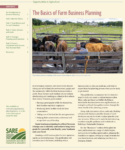
The Basics of Farm Business Planning
Sustainable farming and ranching means taking care of the land, the environment, people and the community, while the farm business makes a profit. Many farmers and ranchers choose sustainable farming and ranching as a lifestyle that reflects their values. Common goals include: Farm business planning is critical because it helps you to identify and achieve […]
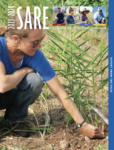
2023–2024 Report from the Field
SARE grants havehelped our viabilityas a business anddemonstrated thatsmall businessescan make a positiveimpact on theenvironment when wedevelop relationshipswith each other forthe benefit of all. Jeanine SeabrookGlass Rooster Cannery Letter from the Director I have always appreciated the value of long-term research as well as the long-term impact of both applied and basic research. The core […]
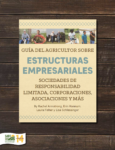
Guía del Agricultorn Sobre Estructuras Empresariales
Establecer y mantener la correcta estructura empresarial para la operación de su granja sienta las bases para un negocio agrícola estable y resiliente. La formación de una estructura empresarial puede ayudar a i) gestionar el riesgo mediante la protección de los activos de las personas propietarias ante las responsabilidades de la empresa; ii) promover las […]
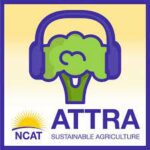
Growing New Markets for Specialty Crops
Voices from the Field is a podcast series co-produced by ATTRA and SARE that explores the different ways farmers are working to create new local markets for specialty and niche crops. Each partner episode will address a different production system or crop–from endives to small-grain value chains–and will feature farmers sharing their production and marketing […]
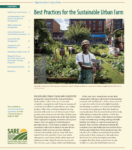
Best Practices for the Sustainable Urban Farm
For decades, urban farms and community gardens have helped meet the demand for fresh, local produce. Urban farms are diverse and adaptable, ranging from small farms on repurposed vacant lots to multilevel vertical farms and rooftop gardens. Often, they combine ecological farming practices with some form of infrastructure. Urban growers make clever use of their […]

The Peri-Urban Agriculture Network: Strategies for Agricultural Viability in Urbanizing and High-Land-Use-Pressure Regions
Many peri-urban regions in the western U.S. are in a state of acute juxtaposition between formerly rural agricultural communities and growing, modern urban centers. Urbanization challenges agricultural viability through land use pressures and a slow unraveling of historically land-based economies and culture. These agricultural circumstances can be very destabilizing and highlight the need for agriculture […]
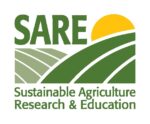
The Northeast Organic Grower Harvest Manual
A manual created by Roxbury Farm Harvest to help commercial, organic vegetable farmers with parameters on pricing, harvest indicators, harvest and postharvest handling procedures, and storage conditions. Each vegetable has a detailed explanation of the various market values, expected yield numbers, standards and the tools needed. Harvest and preparation procedures are laid out for each […]
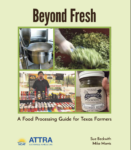
Beyond Fresh: a Food Processing Guide for Texas Farmers
A decision-making guide to planning, creating and marketing value-added food products made from sustainably-grown fruits and vegetables, written from a "farmer-first" perspective. As farmers face competition from meal-in-a-box companies, this guide aims to help farmers prosper in their own food distribution. This Food Processing Guide for Texas Farmers begins with decision-making and walks step by […]
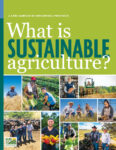
What is Sustainable Agriculture?
This award-winning report provides a sampler of best practices in sustainable agriculture—from marketing and community vitality to cover crops and grazing—as well as eight profiles of producers, educators and researchers who have successfully implemented them.
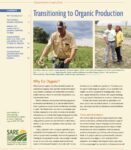
Transitioning to Organic Production
Transitioning to Organic Production lays out many promising conversion strategies, covering typical organic farming production practices, innovative marketing ideas and federal standards for certified organic crop production.